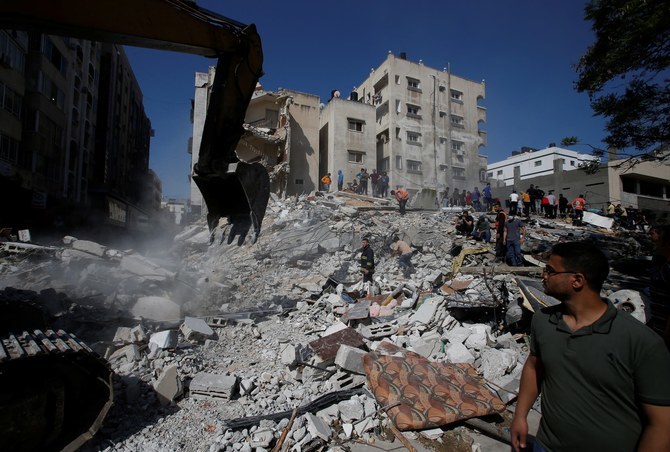
- ARAB NEWS
- 13 Jul 2025

As Egyptian engineers enter Gaza to remove the rubble and rebuild what was destroyed in the recent devastating 11-day war, it is important to take note of the lessons that have been learned this time around.
The first lesson is a realization that despite massive investment in the Israeli image in terms of time, money and effort, the surprising reality to many of us is that the country does not, against widely held beliefs, enjoy the positive international image it is perceived to have. What it does enjoy of course is the support of powerful friends — most notably the United States.
As global outrage manifested against Israel on the streets of major cities, on social media, and in critical statements by world leaders, it became evident — perhaps for the first time in decades — that Israel needs peace, not only because it is the right thing to do, but also for its own self-interest and global image.
Against widely-held beliefs, Israel doesn’t enjoy a positive international image. What it does enjoy of course is the support of powerful friends.
Faisal J. Abbas
Of course, this is not simply the gut-feeling of some writer who has never visited Israel or the occupied territories. It is actually something that veteran government policy adviser Simon Anholt wrote about in the Israeli press last year.
Anholt is globally renowned for his work in developing what has become known as the Nation Brand Index. Writing in the Jewish Chronicles in October 2020, Anholt argued that Israel has, unsurprisingly and historically, ranked very low on that index. He believes this is due to the country’s association with conflict. To be fair, he suggests, if Palestine were listed on the index, it would rank equally low.
Ironically, that extremely honest article was titled “Why Israel should drop the Hasbara.” For those who are unfamiliar with the term, Hasbara is a euphemism for propaganda. It describes public relations efforts by the Israeli government and its supporters to disseminate positive information about the State of Israel and its behavior and actions.
In simple terms, Anholt argues that propaganda is useless, because actions speak so much louder than words. Let us now apply this to what we witnessed recently taking place in Gaza. If we do, then Israeli officials can publicly repeat as much as they want that their country has the most ethical army in the world, but the reality is what viewers worldwide saw were images of crying children driven from their homes in addition to the destruction of buildings housing the international press.
On the flip side, we have FINALLY seen some Palestinians who were able to recapture the narrative and communicate their grievances most effectively.
Please note, however, that when I say “Palestinians,” I am most certainly not referencing the Palestinian leadership in any way, shape, or form. Rather, I am referring exclusively to young, educated, and perfectly eloquent men and women who were able to professionally focus the world’s gaze on the events in Gaza and Sheikh Jarrah, while presenting their case with logic instead of emotions.
I would also argue that the young Palestinians we saw on international news channels have finally managed to begin shattering a negative stereotype that has for too long depicted them as illiterate, uncivilized extremists with an unjust cause.
Similarly, thanks also to social media, many Arabs have been exposed to sympathetic Israelis and Jews that many of us did not even know existed. Just as there are settlers who believe in the occupation and brag about their views which justify confiscating Palestinian homes and land, we saw anti-occupation Israelis and even former IDF soldiers voicing their opposition to such inhumane practices.
However, while many will learn lessons from the recent war, my fear is that much of the current Palestinian leaders will not.
Needless to say, had they agreed to any of the previous US-brokered peace deals, there would surely have existed the possibility that neither this war nor the events in Sheikh Jarrah would have taken place. Also, it would likely have meant that Palestinians would have enjoyed a recognized state, protected by international laws and thus be able to refer to the International Criminal Court (ICC) if need be.
It was sad to see some Palestinian leaders only worsening their public images and alienating their friends by blessing attacks on Israeli civilians.
What has their close dealings with Iran brought the Palestinians except more division and destruction?
Faisal J. Abbas
Not only that, but nobody with the slightest pretense to reasonableness would find cause for celebration in the wake of the heavy toll taken by the 11-day war and yet, Hamas leaders had the audacity to declare victory … and to thank Iran?
What has their close dealings with Iran brought the Palestinians except more division and destruction?
Sadly, many have still not learned the overwhelmingly obvious lesson that Tehran is in it for itself only — with never a minute’s thought for the “cause.” Surely that is correct or why are so-called Iranian Quds brigades occupying several Arab capitals instead of liberating the capital of Palestinians?
If anything has emerged from the rubbles of this most recent war, it is that the true friends of Palestine are the moderate Arab states. Just a reminder, it was countries like Saudi Arabia and Egypt who spearheaded the diplomatic efforts to try and stabilize the situation.
Now as the reconstruction of Gaza begins, we really hope that Palestinians do not witness yet another war in a few years and go through all of this again. However, hope alone does not resolve conflicts, leadership does. Similarly, lack of leadership will only result in more conflict and a lot less hope.